Buying or supplying cigarettes for kids, regardless of how close they are to 18, is unacceptable. If you sell or give cigarettes to kids you could be fined around $20,000.
Did you know that most kids who smoke, get their cigarettes from friends, family and other people that they know!
Don't be the one to give them a lifetime of addiction.
Click here to order your free poster or postcards.
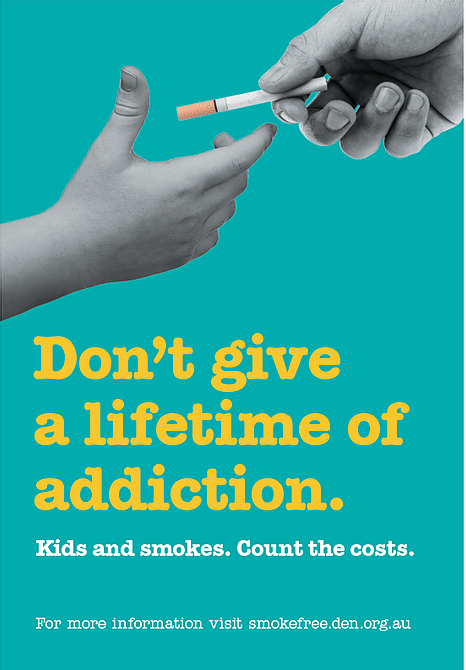
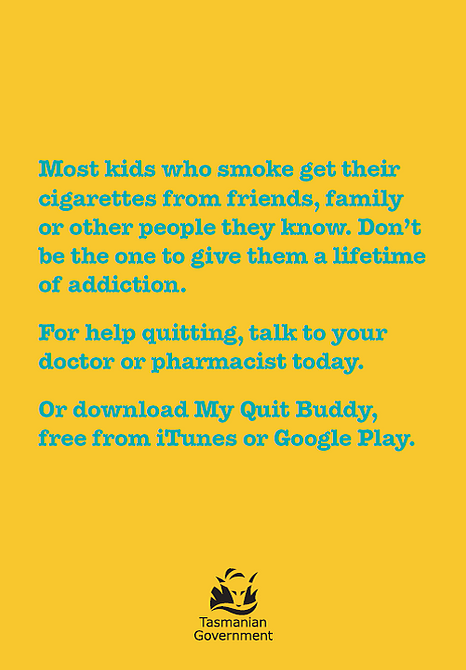
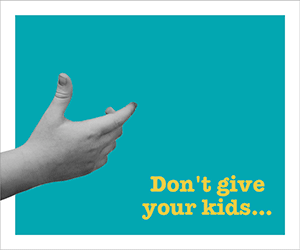
The Public Health Act 1997 was introduced to reduce smoking and its harms to Tasmanians, particularly young people. Let’s explore some of these laws in more detail.
Tobacco laws about advertising
In Australia, tobacco advertising is not allowed on television and radio (since 1976) and newspapers and magazines (since 1992).
In Tasmania, it is illegal to display tobacco products in retail shops such as supermarkets, newsagents and corner stores.
It is also illegal to sell toys or confectionary that look like a cigarette or tobacco products that have fruit or confectionery flavours.
Tobacco companies are not allowed to promote the sale of cigarettes or use tobacco advertisements.
In 2012 the Australian Government introduced ‘plain packaging’ of tobacco products. This means that no company logos, bright colours or images and misleading information can be used on the packaging of tobacco products, such as cigarettes.
Tobacco laws about selling cigarettes and tobacco products to young people
In Tasmania, all retailers selling cigarettes must have a licence and this may be cancelled if the laws relating to the sale of tobacco products are broken.
It is illegal for anyone to sell or supply a tobacco product to a person under 18 years of age. Children who ask adults or retailers for cigarettes are asking that person to break the law!
Tobacco laws about false information
In Tasmania, it is illegal for tobacco companies to provide false information to anyone about the tobacco laws or about the health effects of using tobacco products. There a big penalties in place if this law is broken.
Tobacco laws about smoking to protect people from secondhand smoke
In Tasmania, there are a range of public places that are smoke-free. These are the areas where you cannot smoke:
- Enclosed public places such as shopping centres, pubs and restaurants
- Inside workplaces
- For public buildings, within 3 metres of entry or exits and 10 metres of air intakes for ventilation equipment
- Inside cars with children
- Inside work cars when two or more people are present
- Bus malls and shelters (within 3 metres)
- Pedestrian malls such as Elizabeth Street and Salamanca Square in Hobart, Brisbane Street and Quadrant Malls in Launceston and Rooke Street in Devonport
- Competition and seating areas of sporting events (within 20 metres)
- Children’s playgrounds (within 10 metres)
- Public swimming pools
- Between the flags at patrolled beaches
- Some public events
Laws around the world
In May 2003, the World Health Organisation adopted the Framework Convention on Tobacco Control, the world’s first global public health treaty. By signing and ratifying the treaty, countries commit to a host of measures to reduce the devastating health, social and economic impacts of tobacco. Australia was one of the first parties to sign the treaty on 5 December 2003.
Secondhand smoke contains more than 4000 chemicals that are dangerous to your health. There is no safe level of exposure to second hand smoke. Even Occasional exposure can harm you.
Did you know that when you are around someone who is smoking, you are probably breathing in smoke? This is known as ‘second hand smoking.
Second hand smoke is sometimes called ‘passive smoke’ or ‘environmental tobacco smoke’ but all the terms refer to the smoke which escapes from the burning end of a cigarette and also from the smoker’s mouth when they breathe out.
When they are around someone who is smoking, the amount of smoke a non-smoker breathes in depends on how close they are to the smoker(s), the size of the room, the number of smokers in the room and the number of cigarettes smoked. Opening a window does not protect you from smoke. Using ventilation, air conditioning, or a fan does not will not get rid of second hand smoke.
Exposure to second hand smoke can cause:
- Smelly clothes and hair
- Sore and/or watery eyes
- Sneezing and coughing
- Sore throat
- Breathing and respiratory problems such as pneumonia and bronchitis
- Slower lung growth and decreased lung function
- Increased risk of lung cancer and heart disease
- Asthmatics to experience wheezing and chest tightening
- Ear infections
Breathing in secondhand smoke can make you sick. Some of the diseases that secondhand smoke cause can kill you.
What can you do about it?
Protect yourself
- You have the right to clean air, so politely ask those who smoke to not smoke when they are near you.
- If they don't stop smoking, then move away yourself.
- Remind anyone you know who smokes that smoking is not only bad for them, but harms other people to.
Make your environment smoke free
- Make your house smoke free. Put up a no smoking sign to let visitors know it’s a smoke free zone.
- Make your car smoke free. The law in Tasmania requires cars with young people to be smoke free.
Tasmania has laws that ban smoking in workplaces, some public places and events, restaurants, bars and cars with children inside. However, there are some children and adults that still breathe in second hand smoke in their homes and some public places.
Smoke Free Generation – Be a part of it! is a collaboration of service providers who want to protect young Tasmanians from the harmful effect of tobacco use.
Smoking affects many parts of the body, both inside and outside. Some of the effects happen straight away and others take longer to occur. The diagram below shows some of the harmful consequences of smoking:
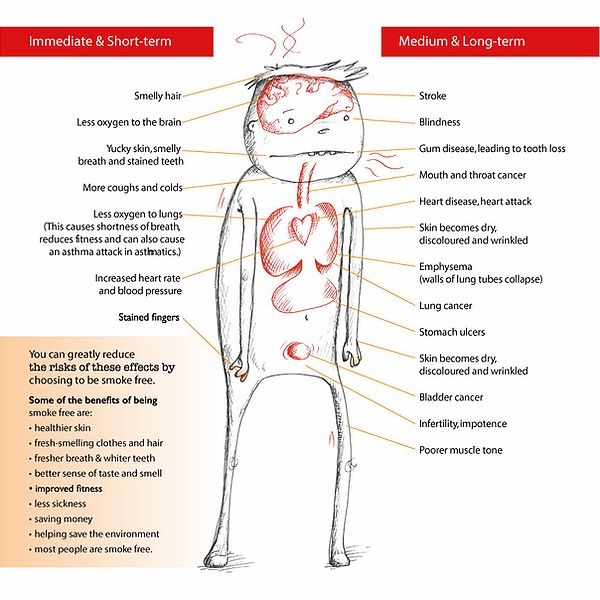
Many people who start smoking think they will be able to stop whenever they want. Unfortunately, the younger people start smoking, the harder it can be to quit. Most adult smokers wish they had never started in the first place.
What happens when you smoke?
Smoking affects your taste and sense of smell. It stops oxygen getting to your brain and other organs (that’s why you might feel dizzy or faint when you smoke) – without oxygen our organs and muscles don’t work as well. Smoking can also make your hair and breath smell, give you stained teeth and fingers and make your skin look really bad
Did you know...
That smoking kills more people in Australia than all the people killed by alcohol, other drugs, murder, suicide, road crashes, rail crashes, air crashes, poisoning, drowning, fires, falls, lightning, electrocution, snakes, spiders and sharks - that’s a lot! Every year in Tasmania, around 502 people die from smoking.
Most people don’t smoke
More than 80 per cent of Tasmanian adults and about 91 per cent of Tasmanian high school and college students don’t smoke. The majority of adult smokers say they wish they’d never started smoking and that they would like to stop. In fact, around 80 per cent of Australians who do smoke have tried to quit.
Nicotine is addictive
Even if you smoke occasionally, such as at a party, you can still get addicted. Nicotine is the addictive drug in tobacco (found in cigarettes). You may become addicted even after smoking a few cigarettes. You may find it difficult to stop or cut down. If you notice feeling anxious, hungry, irritable and find it hard to focus when you haven’t had a smoke, these are signs of withdrawal from nicotine.
Cravings are generally short and pass really quickly – in less than 5 minutes. If you think about how many minutes you’ve been alive, 5 minutes isn’t very long!
Feeling withdrawal symptoms means your body may have been physically and/or mentally dependent on nicotine – scary stuff! Here are some tips that might help manage your cravings:
- Drink water, chew gum or try some healthy snacks
- Get active – try a quick walk or run
- Use your hands – play a game on your phone
- Go online, check Twitter, Facebook or send a message to a friend
- Call the Quitline (137848) or a friend
Support to quit smoking
Our website is designed to help young Tasmanians be smoke free. It includes details on support services in the south, north & north west regions. Check out our Get Local page for more information.
If phone apps are your thing, you can download MyQuitBuddy for free from iTunes or Google Play online stores. Links to these can be found on our Phone Apps page.
You could also try talking to one of these people:
- A doctor or pharmacist for advice on different ways to help with quitting
- A support person at school such as a teacher, social worker or psychologist
- A youth health worker or nurse at a youth health centre
- A Quitline advisor on 137848 (free service)
- Family or friends
Cigarette smoke contains over 7000 chemicals and many of them cause cancer
Cigarettes are made from the dried leaves of the tobacco plant which are grown mainly in China, USA, Brazil and India. The leaves of the tobacco plant are dried by burning trees in ovens. Nearly 5 million hectares of forest are lost each year to produce cigarettes. When a person smokes they damage the environment as well as their health. After the leaves of the tobacco plant have been dried they are treated with many different chemicals.
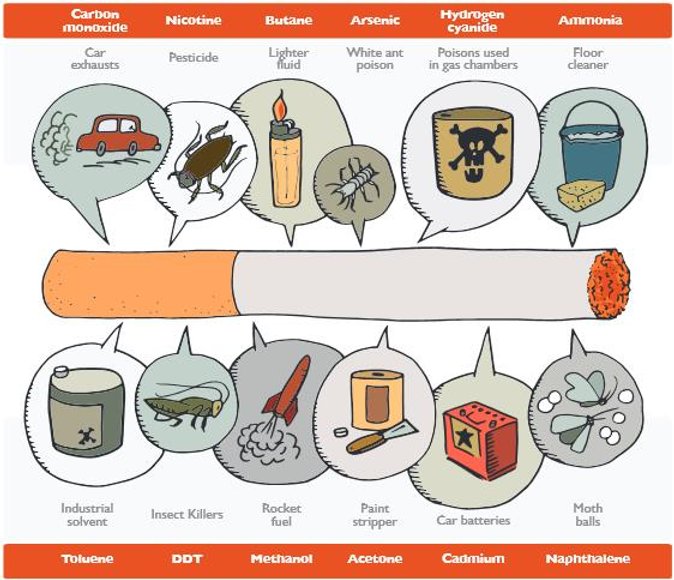
When someone smokes a cigarette they breathe in:
Tar – a black, sticky substance that contains many poisonous chemicals such as ammonia (found in floor and window cleaner), toluene (found in industrial solvents) and acetone (found in paint stripper and nail polish remover). Tar is the main cause of throat and lung cancer. Tar also causes the yellowish brown stains on smokers' fingers, teeth and on the surfaces of rooms and furniture where people smoke heavily.
Nicotine – the drug in tobacco which is addictive. Nicotine is poisonous and has a number of effects on the body. These include increasing heart rate, raising blood pressure and making the small blood vessels under the skin shrink, which can cause wrinkles.
Carbon Monoxide – a poisonous gas that reduces the amount of oxygen a person’s red blood cells can carry. This means less oxygen goes to organs of the body, blood gets thicker and the heart has to work harder.
Hydrogen Cyanide – the poison used in gas chambers during World War II which can kill a person very quickly. Even in low doses it has harmful health effects.
Metals – lead, nickel, arsenic (white ant poison) and cadmium (used in car batteries) are among the many metals found in tobacco smoke.
Insect Killers – such as DDT and Methoprene (found in flea powder) are used in growing tobacco. Other chemicals such as benzene (found in petrol) and naphthalene (found in mothballs) are added when cigarettes are being made.
Radioactive Compounds – are found in cigarettes and cause cancer.
The more cigarettes a person smokes, the greater risk of harm to their body. Nearly 6 million people across the world die every year from smoking. In Tasmania, around 502 people die each year from smoking. Even if you don’t smoke you can still be harmed by being around other people’s smoke.